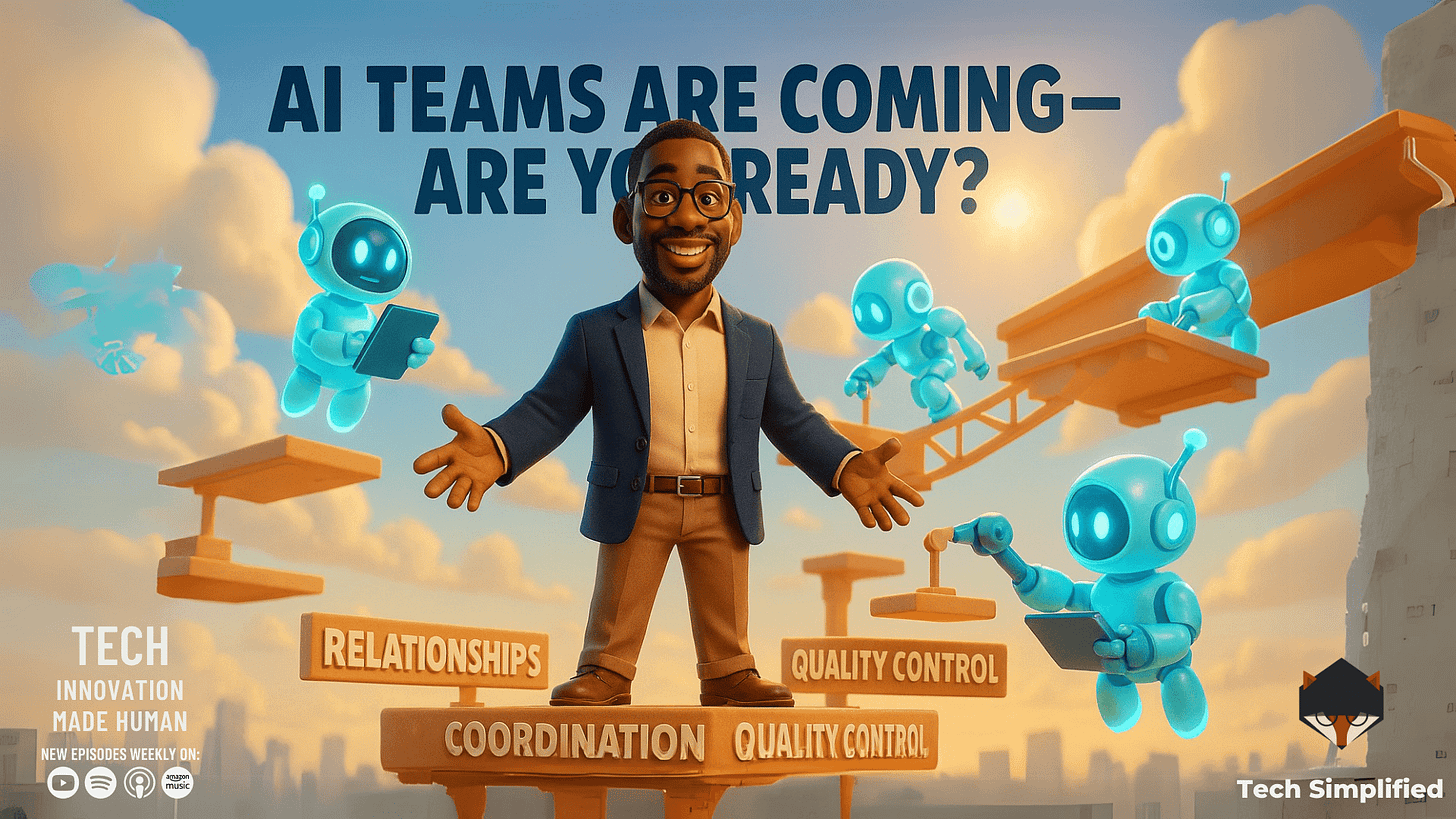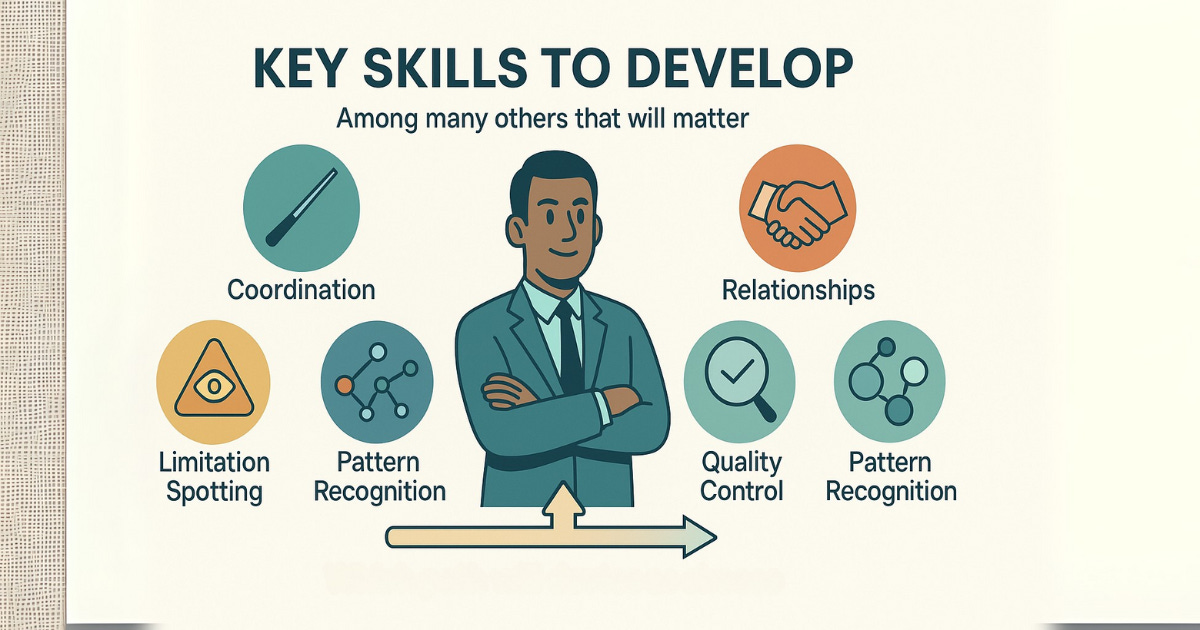The Career Split is Coming: How to Position Yourself on the Right Side
Why AI coordination will divide workers into two groups - and which side you want to be on. Future proof your career.
The Career Split is Coming: How to Position Yourself on the Right Side
Hey family,
The Tech Simplified team here. We've been analyzing what happens when AI systems start working together automatically. Not just using one AI tool, but multiple AI agents coordinating like a specialized team.
We're about to see a major career divide. On one side: people who learn to work WITH AI teams. On the other: people trying to compete AGAINST them.
Guess which group is likely to get the premium opportunities?
📺 Watch the full breakdown: We explore this career shift with practical examples in this week's Tech Innovation Made Human episode 🎧 Prefer audio? Listen on Spotify (Links at the end)
Let us break down what's happening and how to position yourself...
The New Reality: AI Systems Learning to Team Up
New standards are making AI coordination possible, though widespread deployment is still developing:
MCP (Model Context Protocol): Developed by Anthropic and now generally available, this connects AI agents to data and systems. It's already integrated into platforms like Microsoft Copilot Studio and VS Code.
A2A (Agent to Agent): Developed by Google Cloud and currently in preview, this protocol lets different AI systems communicate and coordinate across platforms.
Think of these as foundational technologies that could eventually enable AI systems from different companies to work together automatically. While the protocols exist and function, most real-world implementations are still in pilot or development phases.
Skills That May Become Increasingly Valuable
Here are some attributes that could prove valuable as AI coordination develops. These are suggestions among many skills that will likely matter:
1. The Orchestra Conductor Approach
Instead of focusing only on mastering individual AI tools, developing skills to coordinate multiple AI systems working together could become valuable. The person who can orchestrate several AI agents may have advantages over someone who's only skilled with one tool.
Start here: Look for projects at work involving multiple departments or systems. Practice thinking in workflows, not just individual tasks.
2. The Relationship Builder Focus
When AI systems can handle logistics and coordination, the human who has built genuine relationships may still get the deal. Clients may not care that AI planned the perfect proposal if they don't trust the person presenting it.
Start here: Invest in connecting with people at every company you work with. Be the connector, not just the task executor.
3. The Quality Controller Role
When AI teams make recommendations (and they will make mistakes), someone needs to say "that doesn't make sense" or "we're missing something important here." This human oversight role could become well-compensated because it comes with real responsibility.
Start here: Practice spotting AI limitations in your current work. What assumptions is the AI making? What is it missing?
4. The Cross-Industry Pattern Spotter
AI excels at specializing, but humans may continue to excel at seeing patterns across completely different fields. Noticing that a solution from healthcare could solve a problem in manufacturing represents the kind of insight that may remain distinctly human.
5. The Limitation Identifier
Being the person who can spot what AI systems are missing or what assumptions they're making could become invaluable as AI coordination becomes more complex.
Why This Shift Matters
Previous AI developments focused on individual productivity. This emerging wave is about potential workflow transformation.
As AI coordination develops:
Routine task management may become increasingly automated
Human value might shift toward oversight, relationships, and creative thinking
The skill gap between "AI coordinators" and "AI users" could widen
Practical Steps You Can Consider Taking
Action 1: Practice Multi-System Coordination Volunteer for projects that involve coordinating between different departments or tools. This could serve as practice for potential future AI team management.
Action 2: Build Your Cross-Company Network
Connect with people at client companies, vendors, and partners. If AI systems do eventually coordinate across companies, human relationships may matter more, not less.
Action 3: Position Yourself as an AI Coordinator In your current role, volunteer to figure out how different AI tools might work together. Even small coordination wins could demonstrate you're thinking about AI team management.
Action 4: Develop Your Human-Centric Skills Focus on capabilities that AI currently can't match: creative problem-solving, reading between the lines, managing conflict, inspiring teams. These may become more valuable as AI handles routine coordination.
Action 5: Learn to Spot AI Limitations Practice asking: What is this AI missing? What assumptions is it making? The person who can quality-check AI recommendations could become increasingly valuable.
Getting Started: A Realistic Approach
Week 1: Pick one action from the list above and start experimenting Month 1: Identify one workflow in your job that involves multiple systems or departments Month 3: Volunteer to be the person who explores how different AI tools might connect in your organization Month 6: Build relationships with people at 3-5 companies you work with regularly
Realistic Expectations:
This is likely a multi-year transition, not an overnight change
Early experimentation could provide advantages
Not every job will change immediately, but positioning yourself early may matter
Human oversight and relationships may become more important, not less
The Bottom Line
AI coordination isn't just a technology story - it may represent a career strategy consideration. The people who position themselves as AI coordinators, relationship builders, and quality controllers could command premium opportunities.
Those who wait might find themselves competing with AI instead of collaborating with it.
Important note: These are suggested skills among many that will likely matter. The future remains uncertain, and developing a diverse skill set across technical and human capabilities will likely serve professionals best.
Question for you: Which of these skill areas feels most natural for your current role? Hit reply and let us know - we're tracking how different professionals are approaching this potential transition.
Want to see these concepts in action? Check out this week's Tech Innovation Made Human episode where we break down the technical details and provide more examples. Tech Innovation Made Human episode on Youtube -
or Spotify and all podcast platforms!
Best,
The Tech Simplified Team
P.S. Remember: Tech is but a tool, but YOU are the secret sauce. ✊🏾
P.P.S. If this content gave you clarity about where to focus your career energy, share it with someone who needs to hear it. The window to prepare may be now.





